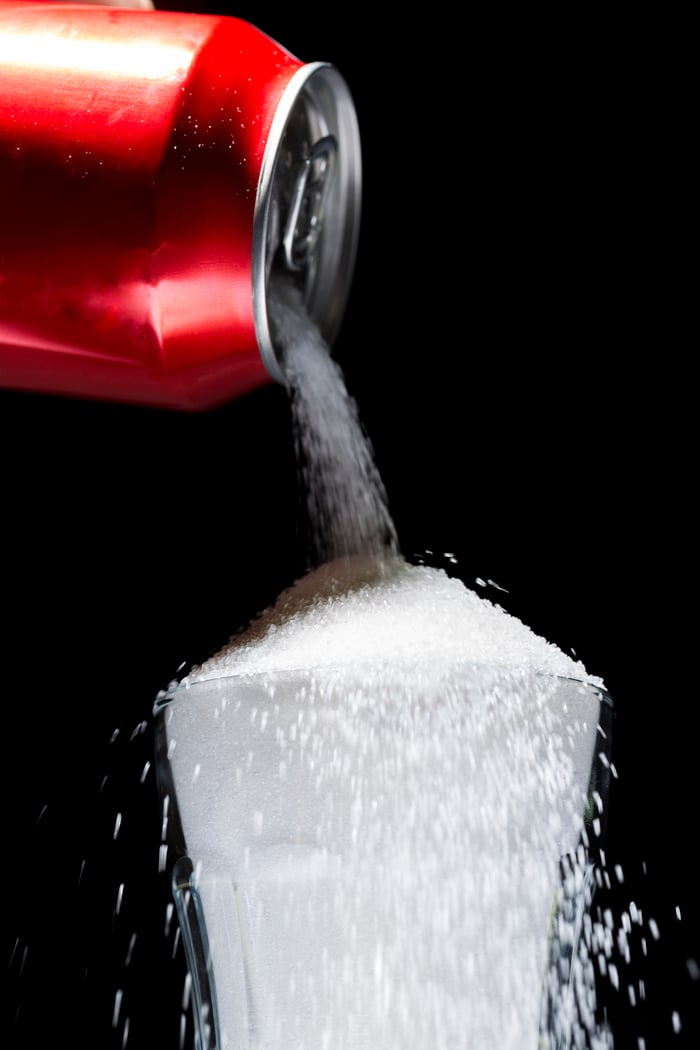
You're going to pay through the nose to drink soda in five cities after voters approved ballot measures imposing new taxes on the sweet drinks. Image source: Getty Images.
It wasn't just votes for Donald Trump or Hillary Clinton that were cast on Election Day. In a handful of municipalities, people were also deciding whether they should impose a tax on sugary beverages. The measures passed in all of them.
Cost of consumption
According to the World Health Organization, there is "reasonable and increasing evidence that appropriately designed taxes on sugar-sweetened beverages would result in proportional reductions in consumption," particularly if they could achieve a 20% price hike or more. The WHO saw how tax policy has affected tobacco use and sought to create parallels to sugary beverages such as soda.
The Center for Science in the Public Interest has said around 40 states have special taxes on soft drinks, but it laments that despite raking in more than $1 billion annually, the taxes aren't high enough to actually curb consumption. It says more and steeper taxes are needed, as well as warning labels.
A not-so-refreshing pause
The experience of diet sodas from Coca-Cola (KO -0.14%) and PepsiCo (PEP 0.33%) shows that education is probably a more effective tool. Business Insider notes that U.S. consumption of diet soda has declined by 27% since its peak in 2005, with such sales today accounting for just 25% of all carbonated-beverage volumes sold, compared with almost 30% 15 years ago. Sales of diet drinks such as Diet Coke and Diet Pepsi account for 94% of the fall-off in sales of carbonated soft drinks since 2010, and all of it was achieved without having to impose a tax.
Instead, it was health concerns over ingredients including artificial sweeteners such as aspartame that caused people to abandon diet soda. Once thought of as an aid in reducing obesity, diet soda is now often shunned by those trying to be healthier. Beverage Digest data shows Diet Pepsi volumes dropped an additional 5.8% last year, while Diet Coke was down 5.6%.

Image source: Getty Images.
A taxing dilemma
But curbing consumption of all soda, both diet and sugar-sweetened, has long been the goal of advocates, and taxes are a favored method of control. Berkeley, Calif.l, was the first U.S. city to impose a soda tax in 2014, while a similar measure in San Francisco failed to gain the two-thirds support it needed to pass, though it did have a majority of voters backing it. Earlier this year, Philadelphia enacted a $0.015-per-ounce tax on both diet and full-calorie soda.
Those efforts have encouraged other cities to try garnering support, and there were four measures on the ballots this year aimed at sugar-sweetened beverages:
- Albany, Calif.: $0.01 per ounce
- Oakland, Calif.: $0.01 per ounce
- San Francisco: $0.01 per ounce
- Boulder, Colo.: $0.02 per ounce
Additionally, commissioners in Cook County, Ill., adopted a penny-per-ounce tax on sugary beverages, a move the Illinois Beverage Association said would raise the cost of a two-liter bottle of soda from $0.99 to $1.67, a 70% increase. The Wall Street Journal reports this tax will also include diet drinks and is expected to raise enough to balance Cook County's budget.
The fact that voters approved all four ballot measures suggests sentiments may be changing, though three-quarters of the cities imposing them this Election Day are in California, suggesting it may be a more localized phenomenon. However, while more than 30 cities and states in recent years failed to gain backing for soda taxes, the 100% success rate this year could see more ballot measures in the future. Big cities like New York, Los Angeles, and elsewhere may follow suit.
New York state defeated a measure several years ago, but former New York City Mayor Michael Bloomberg has helped financed many measures, here in the U.S. as well as internationally. A soda tax in Mexico, for example, was called the Bloomberg Tax, as his philanthropic organization contributed money to the pro-tax campaign. He also imposed a ban on large sizes of soda in New York City, but the state's highest court struck it down.
Slim chance
Will the new taxes hurt Coke and Pepsi? Probably not. As noted, soda sales are already falling, and Pepsi CEO Indra Nooyi has said less than 25% of the company's global sales come from soda -- and that percentage is likely to fall further as it pushes forward on selling "healthy" snacks. Coke is pushing juices and still beverages more and said unit case volumes grew 3% last quarter, primarily driven by water and sports drinks, which also can be sweetened with sugar.
Moreover, because these are local initiatives, not statewide, people looking to avoid paying the tax can just go to a neighboring city to make the purchase, and soda makers may not pass on the full costs to consumers. The National Bureau of Economic Research found retail prices in Berkeley, Calif. -- after a so-called soda tax was approved -- had only seen 22% of the tax passed on to buyers of Coke and Pepsi products. That obviously limits the impact any tax might have.
Taxes may be a popular way to try to curb soda consumption, but they might not be as effective as other less intrusive and costly measures.





